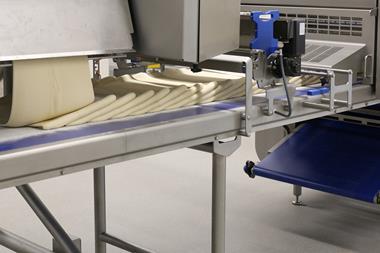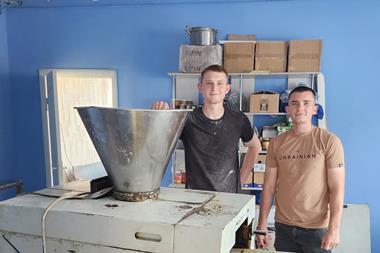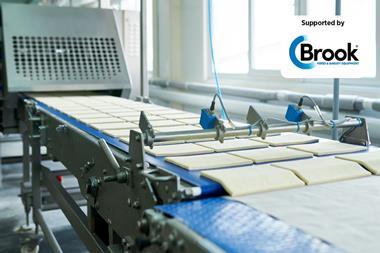As a vital piece of equipment, bakery mixers need to be properly cleaned and maintained to ensure they provide optimum performance... and new designs are helping the process
Ask a baker to name the equipment they cannot live without and their first answer will be their oven. Their mixer is likely to come a close second.
A deceptively simple piece of kit, the mixer is the heart of a bakery operation and has to work incredibly hard, day in day out.
“In busy bakeries it is vital that equipment is maintained so the machines can work at maximum capacity,” says Laurent Valbret, managing director of equipment supplier Creeds. “A machine that has broken down can have a huge impact on businesses, but especially on a small independent bakery.”
Maintenance starts with regular cleaning, particularly as a build-up of any residue on the bowl or tools can prevent the mixer working efficiently. “The golden rule is to clean the mixer at the end of every shift,” says Steve Langan, senior engineer at catering equipment supplier Norbake.
When it comes to regular cleaning, the first step should be to isolate the power, and care should be taken to ensure water does not enter the electrical area of the machine.
“Use a plastic scraper to scrape the inside of the bowl and the spiral to remove any wet dough. Use warm water and a cloth to remove any final residue and, with a damp cloth, clean the external bodywork of the mixer including the guards,” says Langan.
Some machines, including the Ferneto range supplied by Creeds, have fitted bowl drains enabling the bowl to be flooded and cleaned without the need to scoop out water.
%%Quote_15%%
Further maintenance depends on the baker’s mechanical skills and knowledge. “Machines should be checked each week to ensure all parts are in good working order, with special attention paid to the function buttons and power cables,” says Valbret.
It is also essential to check safety guards are working correctly at the start of a shift.
Manufacturers have worked hard to make equipment easier to maintain. Mono, for example, uses sealed gear boxes and motors on its mixers that require little or no maintenance, while the majority of its bowls and tools are made from stainless steel to make them easy to clean. Ferneto mixers, meanwhile, are mounted on legs to make cleaning underneath the mixer easier, while castors enable users to move them for easier maintenance access.
For high-volume production, supplier EPP carries mixers, including the recently launched VMI Verymix III batch mixers, that offer easy access to the bowl cover through a platform, while spray nozzles ensure CIP (clean-in-place) cleaning. “All the main mechanical elements of the mixer are easy to access via side doors and both the bearings and gear motor with flexible coupling can be exchanged without having to take off the bowl or its mixing rotor,” says EPP managing director Steve Merritt.
Unsurprisingly, equipment suppliers recommend that all bakers take out maintenance contracts or service plans. “A regular service will not only encompass essentials like the conditions of drive belts, oil levels (where applicable) greasing of moving parts,” says Langan. “An engineer will also look at the wiring and other electrical parts, check the integrity of safety switches and be able to spot any potential future issues caused through normal wear and tear.”
But should something go wrong, the first step should be to switch off the mixer. “Never run the mixer if it’s making any kind of grinding, rumbling or banging noise outside its normal operating parameters,” says Langan. “More damage can occur and you could potentially end up with metal filings or oil in the product.”
Regular cleaning and maintenance will go a long way to preventing such a worst-case scenario and ensure your mixer keeps running smoothly.
Case study: From bikes to bakes
A former motorbike showroom on an industrial estate in Slough has been transformed into bakery and coffee shop Priestley’s Bakery
Opened last year, it is the creation of master baker Mark and his wife Odette, who also run a haulage company with a fleet of 50 vehicles.
“We chose the location as it had a large customer base due to its proximity to existing businesses already on the trading estate, therefore guaranteeing good footfall,” they say.
A large viewing window behind the service area enables the bakery’s 300 customers a day to see all products being created from scratch.
Equipment for the business was supplied by Mono, and includes a Harmony Modular Deck Oven, Fusion Bread Plant, 2-Pocket Roll Plant and Esmach Natural Yeast Processor.
Mixing requirements are fulfilled using two Esmach Spiral Mixers (pictured left), which are suitable for all kinds of dough and are designed to make the mixing process as simple and efficient as possible.
“We chose Mono Equipment as we wanted to use one supplier for all our equipment and, being based in the UK, Mono had a great reputation for supplying a complete range of high-quality and reliable equipment,” say Mark and Odette.
Case study: William Sword, Cumbernauld
Family business William Sword makes a wide range of goods including bake-off lines, frozen pastry products and cakes from its Groveside Bakeries in Cumbernauld.
The business, which was founded in 1894, recently sourced a new mixer to replace existing equipment that was no longer up to the task.
The company’s choice was a VMI SPI 400 AV supplied by EPP. The mixer has a maximum dough capacity of 250kg, and two operating speeds for the mixing tool – 105 and 210 rpm. The bowl is positively driven by a pinion, and drive reduction is achieved by the use of belts and not a gear box which would require cleaning, greasing and evacuation.
“Not only were we impressed with the quality of the build, it was the solid back-up offered by VMI and EPP that clinched the deal,” says joint managing director Douglas Sword.
Although extremely versatile and designed to produce a wide range of high-quality doughs, William Sword is using its new mixer to produce French and Scotch butter puff pastry. The business also opted for an additional mixing bowl on a trolley, which is important in its manufacturing operations where cross-contamination issues have to be taken into account.





























No comments yet